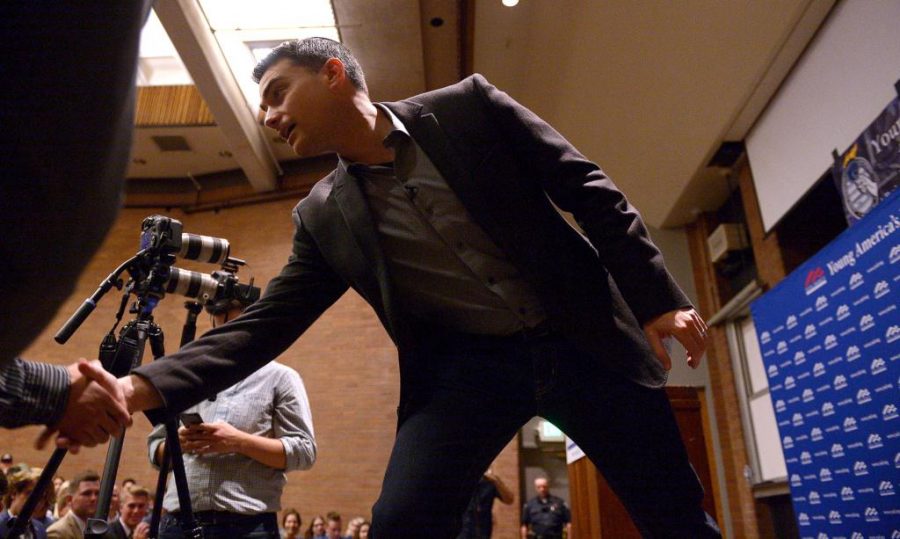
Leah Hogsten, The Salt Lake Tribune
Controversial conservative commentator Ben Shapiro, editor-in-chief of the Daily Wire and former editor-at-large of Breitbart News, fields questions from students attending the Young Americans for Freedom during his speech at the University of Utah's Social and Behavioral Sciences Lecture Hall, Wednesday, September 27, 2017. Shapiro was invited by the student organization sponsored by Young America’s Foundation, the parent organization over campus Young Americans for Freedom chapters, not the university itself.
A crowd of conservative students and community members chanted “U.S.A, U.S.A, U.S.A!” as Dillon Clark, the leader Young Americans for Freedom at the University of Utah took the stage to test the microphone. After 10 minutes of checking the equipment, Clark thanked the U’s police department, U staff and YAF donors for their hard work. He then said he encouraged the right to free speech of the approximately 300 students outside the Social and Behavioral Science Auditorium at the University of Utah protesting the speaker — conservative radio host and founder of The Daily Wire Ben Shapiro.
Clark told the audience that YAF reserved the right to eject those who try to disrupt Shapiro, who spoke on what he called “the myth of white privilege,” a stance many disagree with. Four students left the event in protest before Shapiro began to speak.
“It’s pathetic that we actually need that on a college campus,” said Shapiro after taking the stage. “That we actually need scores of police officers to protect us against people that might get violent.”
Shapiro was referencing the thousands of dollars and multiple law enforcement agencies needed to manage the security outside the event. Although there were only 400 tickets available, security was roughly equivalent to, as U Police Chief Dale Brophy put it later, “an average football game.”
Shapiro went on to call out student activists at the U that threatened to shut down his talk, citing a letter Students for a Democratic Society member Ian Decker wrote to The Salt Lake Tribune. He read an excerpt from the letter, which said, “This will not be a violent protest but we intend on exercising our free speech in the boldest and most unapologetic way we can, even if Ben Shapiro, his fans and campus police would have it otherwise.”
“Again, I would not have it otherwise that you’re outside making fools of yourselves, it’s great for the cameras and it just demonstrates that you have no clue what you’re talking about,” said Shapiro. “And now for the actually offensive part of the speech.”
Shapiro delved into a number of controversial topics to support his views on white privilege, mainly to show that, as he put it, “No one is a victim.”
He claimed “the left” has created a hierarchy of privilege, with the most oppressed being people who identify as LGBT, and white, straight males on the bottom as the least oppressed. He then went down the list one-by-one and tried to make the case that each group isn’t victimized by the system.
In reference to the U.S. Supreme Court case Masterpiece Cakeshop v. Colorado Civil Rights Commission, he said LGBT couples should essentially vote with their dollars by going to an alternate bakery rather than buy a wedding cake from a bakery that discriminates against them.
Shapiro cited statistics he said show that the actual incidences of rape on college campuses was lower than that of women elsewhere, though he later asserted that rapists should all either be imprisoned for life, castrated or killed. He then told the audience that the wage gap between men and women only exists because women tend to want to have and nurture children.
He said that although people of color have had a tumultuous history and that history impacts their social standing, all minorities should be able to succeed in American society because Asians can.
The event concluded with a Q&A session, in which opponents of Shapiro were asked to go to the front of a line. Audience members asked questions ranging from education, to gay marriage, to religion. Most of those who asked questions shook Shapiro’s hand afterward. Although not everyone in attendance agreed with his message, the consensus was that he had the right to express it.
Shapiro said, “If you can find one person — one in America — who has been physically harmed by my speech, I dare you to find them and show them to me.”
s.morgan@dailyutahchronicle.com
